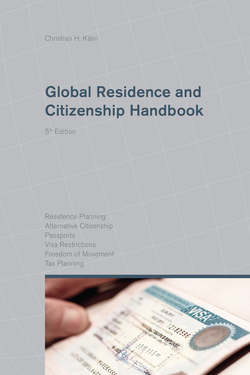Читать книгу Global Residence and Citizenship Handbook - Christian H. Kälin - Страница 46
На сайте Литреса книга снята с продажи.
Chapter Summary
ОглавлениеHenley & Partners was the first firm to globally specialize in the field of citizenship planning. Today there are many reasons why you should consider becoming a citizen of more than one country.
There are a variety of different benefits to alternative citizenship. As citizenship may impact on your tax status, it could be a key factor in international tax planning. Alongside this, you may gain more privacy and security across your banking and investment portfolio. Frequent travellers, especially those who often require visas, find a second citizenship invaluable in ensuring flexibility and the ability to travel at short notice. Those who have the need to live in a safer country than their own, either now or in the future, can obtain that security through citizenship.
The most common factors in acquiring citizenship are by birth, by descent, by marriage or by grant. The US is an important example of the few countries that still grant citizenship by birth. Many people will be entitled to another passport by descent or by birth, and this may be easy to establish.
If birth, descent or marriage do not offer a solution, there are other options open to wealthy or skilled individuals. Seven countries offer citizenship-by-investment, Antigua and Barbuda, Austria, the Commonwealth of Dominica, Cyprus, Grenada, Malta and St. Kitts and Nevis, and can give you a new passport swiftly and legally, which is of paramount importance, as illegal options are commonplace.
When considering any of these options, you must remember to take guidance on dual citizenship, as roughly only half of the world’s countries allow this.
Finally, and of great importance, is the reputation of the country and its passport. The level of visa-free travel it affords you will be critical to the impact and benefits it has on your life.
In recent times, and especially since the dramatic events of 9/11, questions of citizenship, visa restrictions and freedom of movement have become more and more important for internationally active individuals and families, although the concept of citizenship planning was created by Henley & Partners about 20 years ago.
A main characteristic of the modern world system is that economy and trade increasingly take place on an international level, while people are still bound within nation-states by the instruments of citizenship and sovereignty.20 This new, transnational flexibility in business, production, labour and financial markets, travel and international family relations is increasingly being matched with flexible citizenship. This field can be described as the strategies and impacts of internationally mobile individuals and families seeking to optimize their situation in view of different nation-state regimes by selecting different sites for work, investments, leisure and family relocation.21 Indeed, there are many reasons why all over the world more and more wealthy individuals consider becoming a citizen of more than just one country, and consequently holding more than one passport.22
